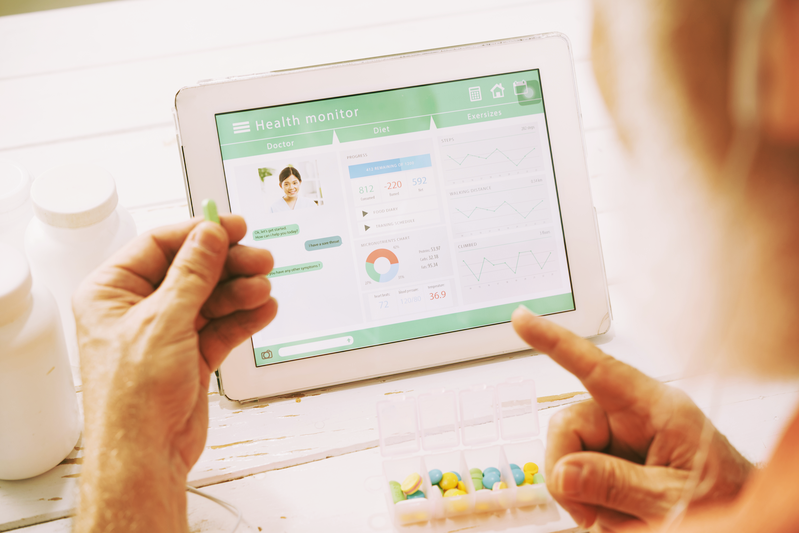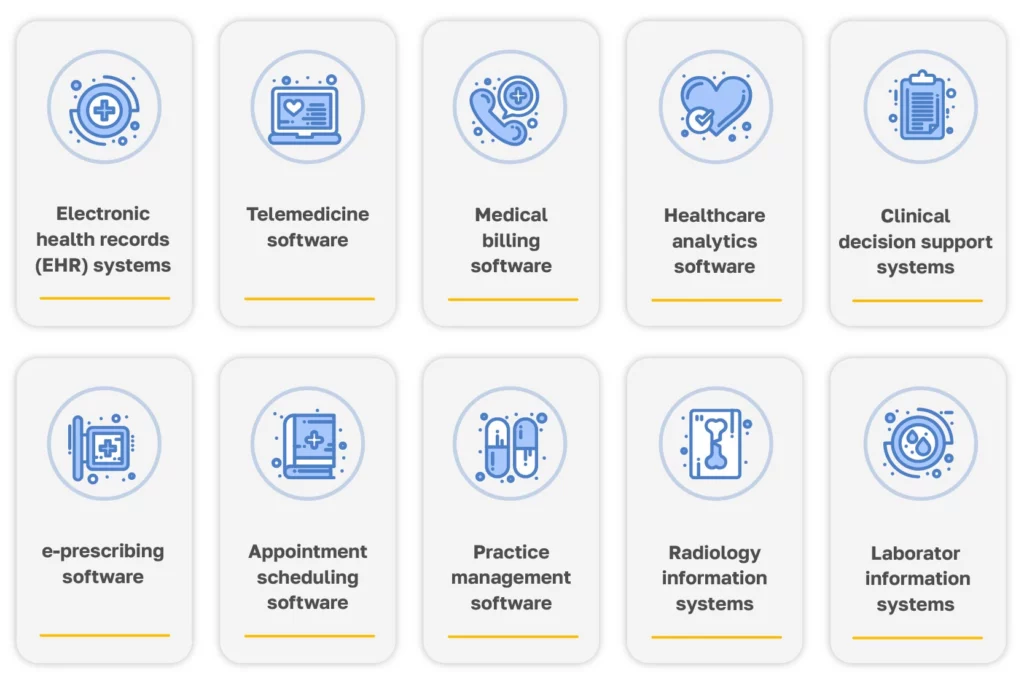Are you searching for a seamless integration of technology into your healthcare services? Have you had enough of the headaches of managing patient records, scheduling, and billing? The frustration of juggling multiple platforms, the annoyance of redundant tasks, and the anxiety of potential errors can weigh heavily, leaving you yearning for a way out. Software in healthcare can help you with that.
With our experience transforming practices in the healthcare industry through technology, WillDom is here to guide you through some popular digital healthcare solutions that could be precisely what you’re looking for.
Table of Contents
How Does Software Development Outsourcing Benefit the Healthcare Industry?
Outsourcing can lead to innovative healthcare software development solutions tailored to specific needs, ensuring compliance with healthcare regulations and standards. Additionally, outsourcing software development provides scalability and flexibility, enabling healthcare providers to adapt to changing healthcare demands and focus on their core mission: patient care.

10 Top Types of Software Used in Healthcare
The digital transformation within the healthcare sector has led to the development of various software solutions and software development outsourcing trends. This has strived to enhance the efficiency, accuracy, and quality of healthcare services. Understanding their functionalities and their impact on healthcare providers and patients is crucial.
Here are the ten top types of software used in healthcare:

#1 – Electronic health records (EHR) systems
Electronic health record software is a digital version of patients’ paper charts, offering a real-time, patient-centered repository for information about a patient’s medical history, treatments, and diagnostic records. They facilitate seamless data sharing among authorized medical professionals, ensuring the information is accurate, accessible, and secure.
Without EHR systems, medical professionals would have to rely on physical documents, leading to inefficiencies, an increased risk of errors, and delays in accessing vital patient information. It could result in compromised patient care and safety, as critical decisions might be made based on incomplete or outdated information.
#2 – Telemedicine software
Telemedicine software enables medical staff to offer services remotely, using digital communication tools to consult, diagnose, and treat patients. This type of system has become especially crucial in extending healthcare access to remote or underserved areas, ensuring continuity of care without the need for physical presence.
Operating without telemedicine software, especially during global health emergencies, would severely limit access to care for those in remote areas or with mobility issues, potentially leading to the neglect of minor health issues until they become severe.
#3 – Medical billing software
Medical billing software automates the preparation and submission of medical claims, ensuring that medical professionals are reimbursed for their services. It streamlines the billing process, reduces errors, and accelerates payment cycles.
Without this solution, billing processes would be manual, time-consuming, and prone to errors. It would lead to delayed payments, increased denials, and significant administrative burdens, ultimately impacting the financial stability of medical practices.
#4 – Healthcare analytics software
Healthcare analytics software analyzes vast amounts of healthcare data to derive insights to improve patient outcomes, operational efficiencies, and strategic planning. This system enables data-driven decision-making, identifying trends and patterns that might not be apparent otherwise.
Without such analytical capabilities, medical practitioners would miss opportunities to optimize medical services delivery, reduce costs, and implement preventive health measures. This could potentially lead to less informed decision-making and suboptimal patient outcomes.
#5 – Clinical decision support systems
Clinical decision support systems (CDSS) provide healthcare professionals with knowledge and patient-specific information that is intelligently filtered and presented at appropriate times to enhance health. They support decision-making in clinical workflow, improving the quality of care.
Without CDSS, clinicians might overlook vital patient information or emerging clinical evidence, increasing the risk of diagnostic errors and less effective patient care. This would happen due to the overwhelming amount of data and the complex nature of healthcare.
#6 – e-prescribing software
E-prescribing systems allow medical professionals to send prescriptions directly to pharmacies electronically, reducing prescription errors and improving efficiency. This system also checks for drug interactions, allergies, and other contraindications, enhancing patient safety.
Without e-prescribing, traditional paper-based prescribing is prone to legibility issues. It would lead to potential medication errors, adverse drug interactions, and a more significant administrative burden in rectifying mistakes.
#7 – Appointment scheduling software
Appointment scheduling systems automate appointment booking, rescheduling, and cancellation. It provides patients with the convenience of booking appointments online and receiving reminders, reducing no-shows and optimizing clinic schedules.
Without this software, scheduling would be a manual, error-prone process, leading to double bookings, increased no-show rates, and poor patient experience due to long wait times and inefficient service.
#8 – Practice management software
Practice management software, or hospital management software, streamlines healthcare practices’ day-to-day operations, encompassing everything from appointment scheduling to billing and reporting. It improves administrative efficiency, allowing practices to focus more on patient care.
Lacking such a system would lead to disorganized operations, inefficiencies, and a higher likelihood of errors in patient data and billing information, impacting patient satisfaction and the bottom line.
#9 – Radiology information systems
Radiology information systems (RIS) are specialized tools for managing imaging department workflows, from scheduling and tracking patient appointments to storing images and radiology reports. They enhance the efficiency and quality of radiological services.
Operating without RIS would result in disorganized workflows, longer wait times for imaging procedures, and delays in diagnosis and treatment. Managing the high volume of imaging data manually is highly impractical and error-prone.
#10 – Laboratory information systems
Laboratory information systems (LIS) manage the process and data associated with laboratory tests, from order entry to result delivery. They ensure accuracy, efficiency, and quick turnaround times for lab results critical for diagnosis and treatment.
Without an LIS, laboratories would struggle with data management, leading to increased errors, slower processing times, and potential delays in diagnosis. This inefficiency could directly impact patient care and outcomes, highlighting the indispensability of such systems in modern healthcare settings.

We Can Help You Build Custom Healthcare Software!
The notion that a single software solution can meet the diverse and dynamic needs of every practice, clinic, or hospital is far from reality. Healthcare organizations vary significantly in their operations, specialties, and patient care approaches, making the “one-size-fits-all” software solutions often inadequate.
Recognizing the unique demands of healthcare organizations, WillDom emerges as your ideal partner in building custom healthcare software development solutions. At WillDom, we connect you with top-tier talent and cutting-edge technologies to create software that’s a transformative asset for your organization.
Contact WillDom today and let our healthcare software development services propel your healthcare services to new heights!

